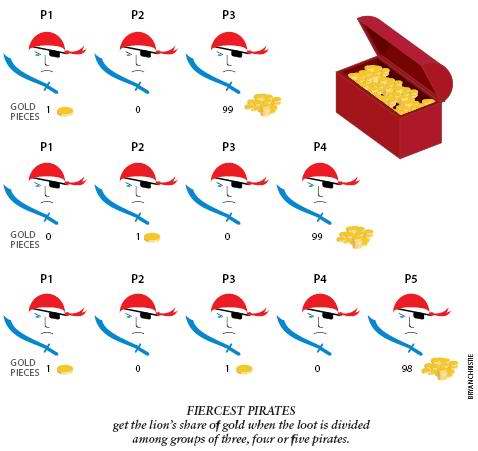hdu1538 A Puzzle for Pirates
A Puzzle for Pirates
Time Limit: 2000/1000 MS (Java/Others) Memory Limit: 65536/32768 K (Java/Others)Total Submission(s): 289 Accepted Submission(s): 92
Problem Description
A bunch of pirates have gotten their hands on a hoard of gold pieces and wish to divide the loot. They are democratic pirates in their own way, and it is their custom to make such divisions in the following manner: The fiercest pirate makes a proposal about the division, and everybody votes on it, including the proposer. If 50 percent or more are in favor, the proposal passes and is implemented forthwith. Otherwise the proposer is thrown overboard, and the procedure is repeated with the next fiercest pirate.
All the pirates enjoy throwing one of their fellows overboard, but if given a choice they prefer cold, hard cash, the more the better. They dislike being thrown overboard themselves. All pirates are rational and know that the other pirates are also rational. Moreover, no two pirates are equally fierce, so there is a precise pecking order — and it is known to them all. The gold pieces are indivisible, and arrangements to share pieces are not permitted, because no pirate trusts his fellows to stick to such an arrangement. It's every man for himself. Another thing about pirates is that they are realistic. They believe 'a bird in the hand is worth two in the bush' which means they prefer something that is certain than take a risk to get more, where they might lose everything.
For convenience, number the pirates in order of meekness, so that the least fierce is number 1, the next least fierce number 2 and so on. The fiercest pirate thus gets the biggest number, and proposals proceed in the order from the biggest to the least.
The secret to analyzing all such games of strategy is to work backward from the end. The place to start is the point at which the game gets down to just two pirates, P1 and P2. Then add in pirate P3, P4, ... , one by one. The illustration shows the results when 3, 4 or 5 pirates try to divide 100 pieces of gold.

Your task is to predict how many gold pieces a given pirate will get.
All the pirates enjoy throwing one of their fellows overboard, but if given a choice they prefer cold, hard cash, the more the better. They dislike being thrown overboard themselves. All pirates are rational and know that the other pirates are also rational. Moreover, no two pirates are equally fierce, so there is a precise pecking order — and it is known to them all. The gold pieces are indivisible, and arrangements to share pieces are not permitted, because no pirate trusts his fellows to stick to such an arrangement. It's every man for himself. Another thing about pirates is that they are realistic. They believe 'a bird in the hand is worth two in the bush' which means they prefer something that is certain than take a risk to get more, where they might lose everything.
For convenience, number the pirates in order of meekness, so that the least fierce is number 1, the next least fierce number 2 and so on. The fiercest pirate thus gets the biggest number, and proposals proceed in the order from the biggest to the least.
The secret to analyzing all such games of strategy is to work backward from the end. The place to start is the point at which the game gets down to just two pirates, P1 and P2. Then add in pirate P3, P4, ... , one by one. The illustration shows the results when 3, 4 or 5 pirates try to divide 100 pieces of gold.

Your task is to predict how many gold pieces a given pirate will get.
Input
The input consists of a line specifying the number of testcases, followed by one line per case with 3 integer numbers n, m, p. n (1 ≤ n ≤ 10^4) is the number of pirates. m (1 ≤ m ≤ 10^7) is the number of gold pieces. p (1 ≤ p ≤ n) indicates a pirate where p = n indicates the fiercest one.
Output
The output for each case consists of a single integer which is the minimal number of gold pieces pirate p can get. For example, if pirate p can get 0 or 1 gold pieces, output '0'. If pirate p will be thrown overboard, output 'Thrown'.
Sample Input
3 3 100 2 4 100 2 5 100 5
Sample Output
0 1 98The situation gets complicated when a few gold pieces were divided among many pirates.HintHint1:如果n<=2*m+1决策者得到m-(n-1)/2个,非决策者,如果,与决策都奇偶相同得到1个否则是0个.2:n==2*m+2^k,刚决策者得到0个,其它人因为不确定得到都是0个,3:如果n>2*m+1且非2中的情况,则当是决策者的时候,是得扔出去的,不是决策者的时候,就不确定为0!
#include <iostream>
#include <stdio.h>
#include <string.h>
using namespace std;
int pri[14]={2,4,8,16,32,64,128,256,512,1024,2048,4096,8192,16384};
int solve(int n,int m,int p){
int i,m2=2*m;
if(n<=m2+1){
if(p!=n&&((p&1)==(n&1)))
printf("1\n");
else if(p==n)
printf("%d\n",m-(n-1)/2);
else
printf("0\n");
return 1;
}
int temp=n-m2;
for(i=0;i<14;i++){
if(temp==pri[i]){
printf("0\n");
return 1;
}
}
for(i=0;i<14;i++){
if(temp<pri[i]){
if(p>m2+pri[i-1]&&p<m2+pri[i])
printf("Thrown\n");
else printf("0\n");
return 1;
}
}
}
int main()
{
int tcase,n,m,k;
scanf("%d",&tcase);
while(tcase--){
scanf("%d%d%d",&n,&m,&k);
solve(n,m,k);
}
return 0;
}